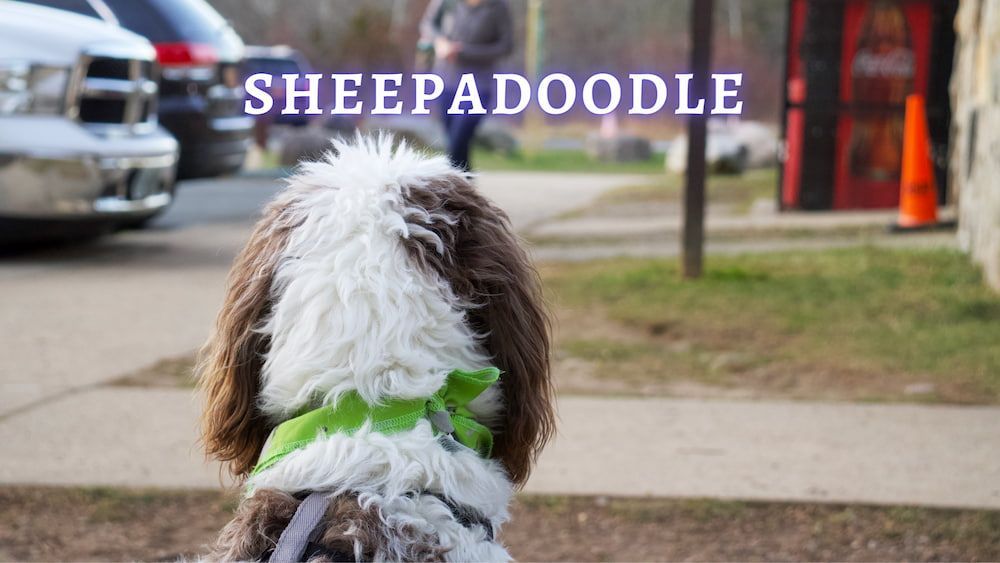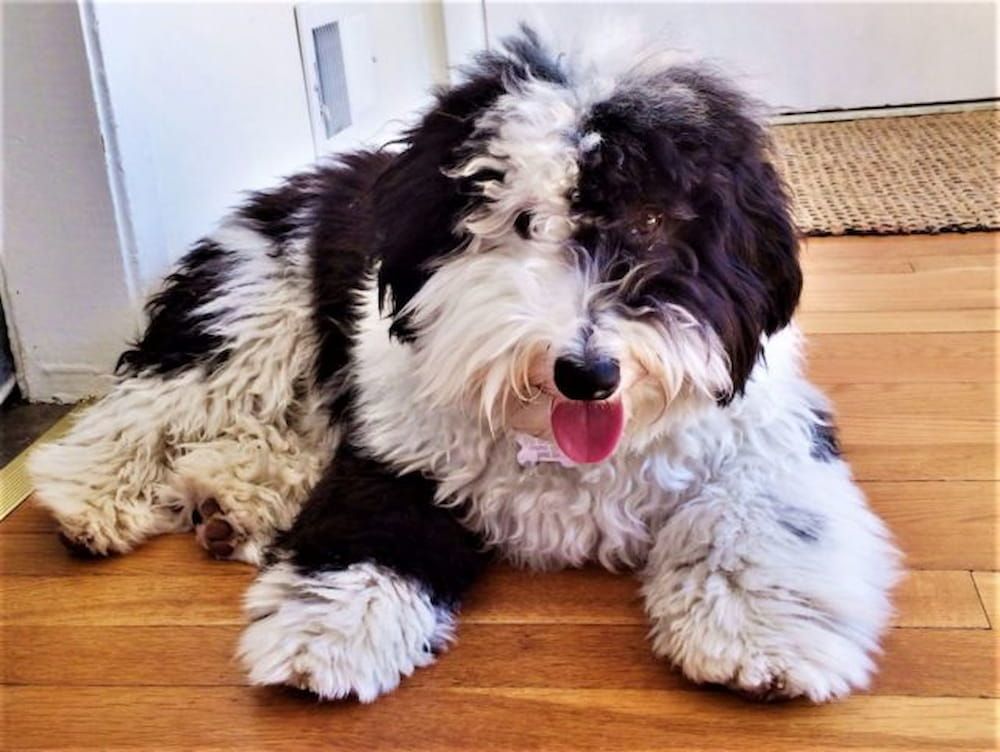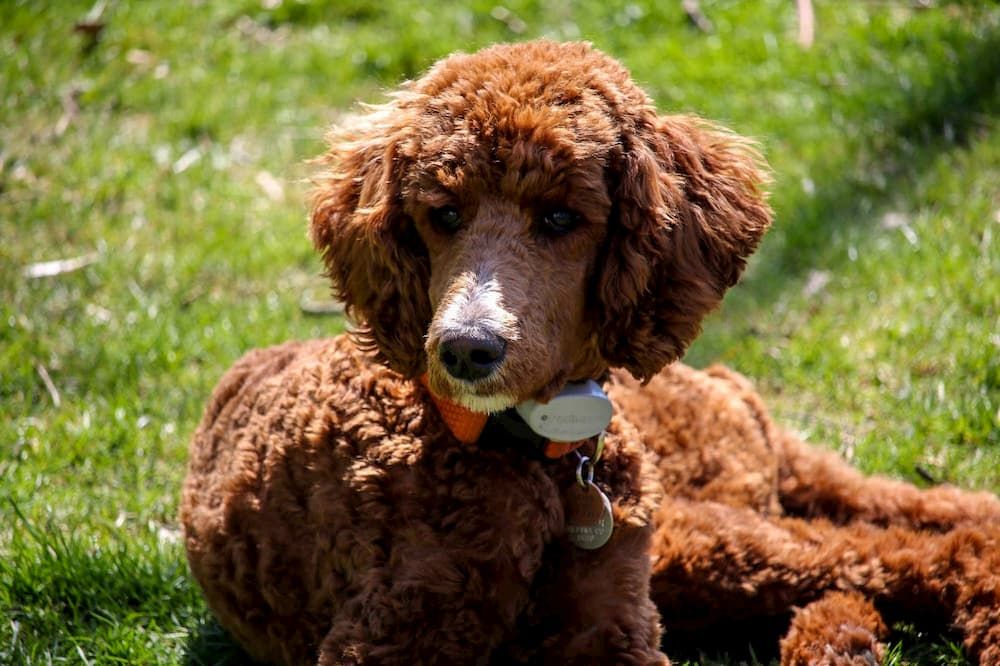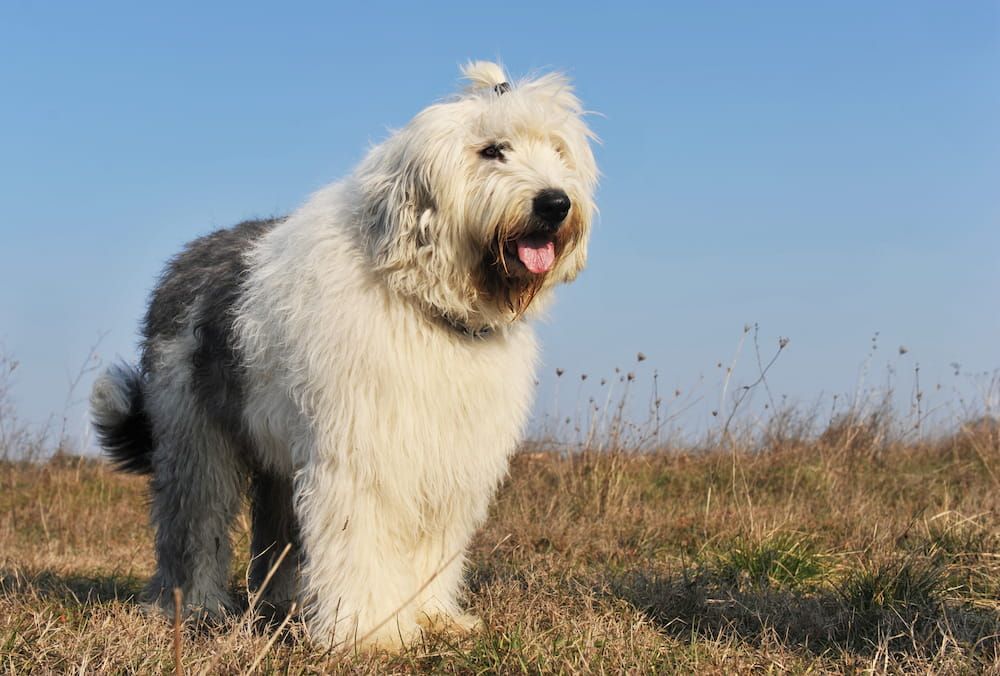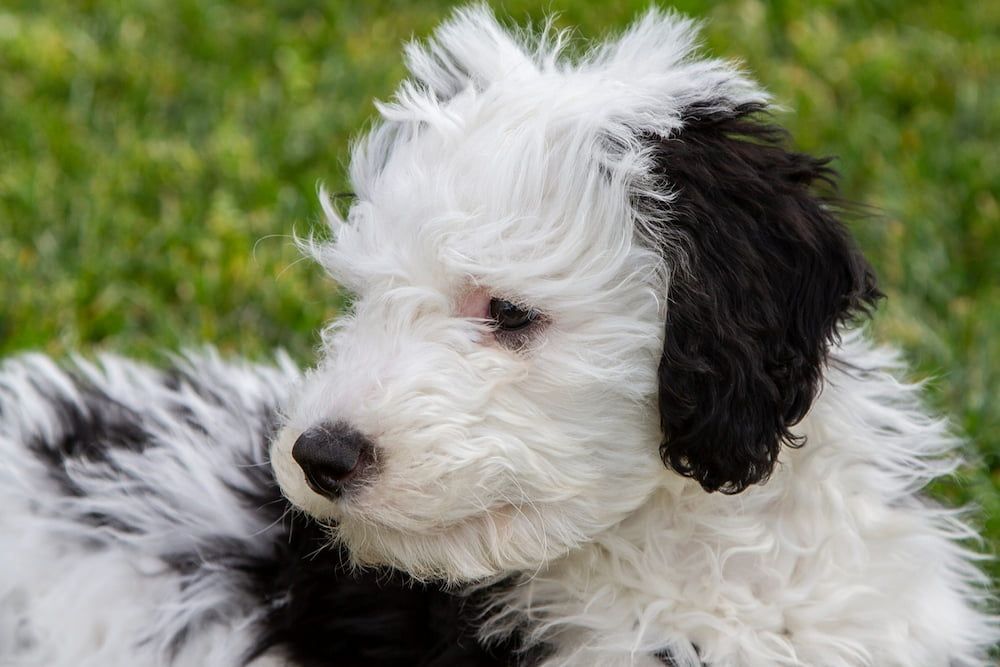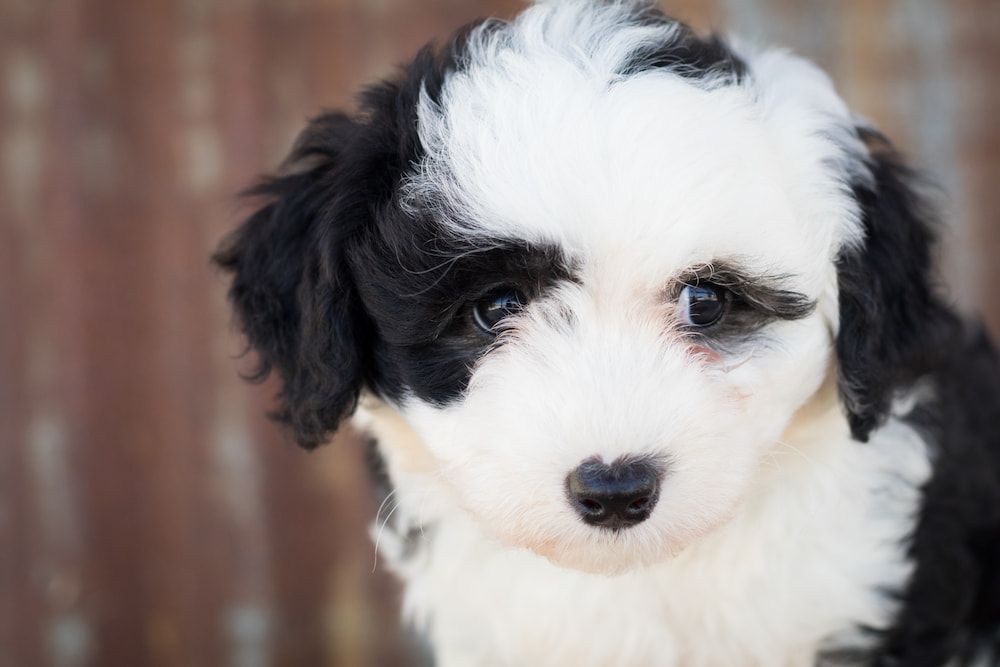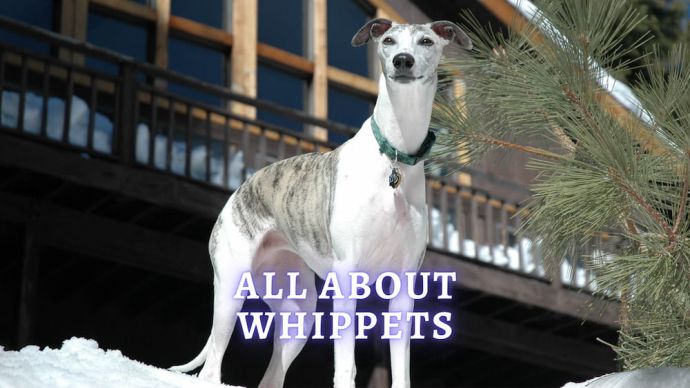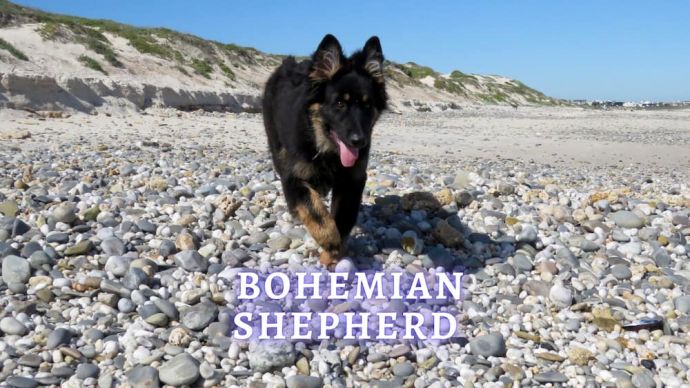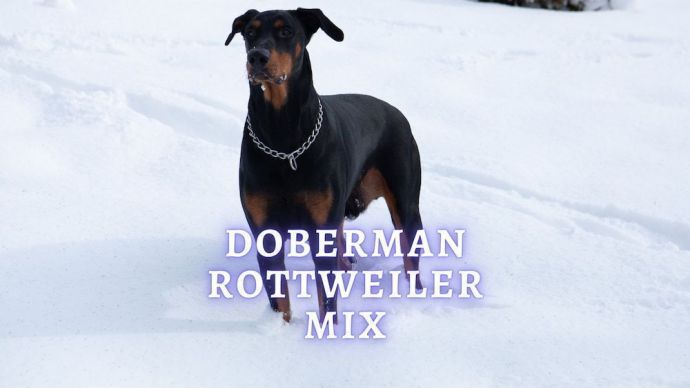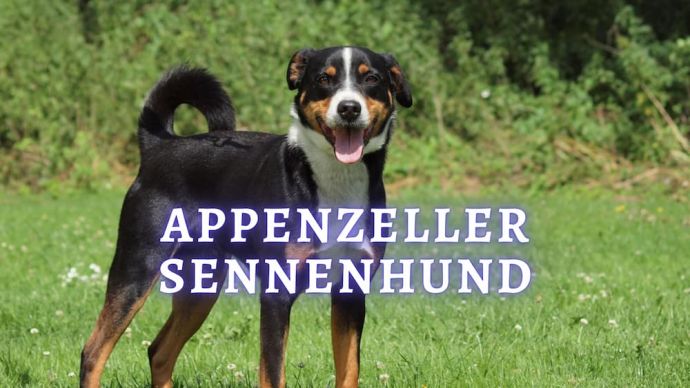Sheepadoodle: Shedding, Care, Temperament and Adoption
Written by:
Author: Carol Young
Carol has worked in specialty, emergency, mixed animal and general veterinary practices, and enjoys all aspects of veterinary medicine. Her special areas of interest include anesthesia, critical care, emergency, dentistry, internal medicine and small animal nutrition.
View all 62 articlesLearn about our editorial process and veterinary review board.
Viewed: 63
Updated on: 12/23/2022
The Sheepadoodle, also known as a Sheepdog Poodle or a “Sheepapoo,” is a cross of an Old English Sheepdog and a Standard Poodle. This relatively new mixed breed is typically a medium-sized dog and has become famous for its friendly personality, playfulness, and teddy bear-like hair coat.
With the Sheepadoodle, dog lovers can enjoy both traits of the Poodle and the Old English Sheepdog. If you are interested in bringing a Sheepadoodleinto your home, there are several things you may want to know first.
Characteristics
Most Sheepadoodles weigh between 65–85 pounds, with males typically weighing more and standing taller at 22 inches. The breed is considered a medium-sized mixed breed, and the average lifespan is around 12 to 15 years. Although Sheepadoodles can be smaller if an Old English Sheepdog is bred to a Miniature Poodle, these varieties are not common.
The hair coat of the Sheepadoodles is usually a bit curly and wavy and comes in various colors such as black and white or any shade of gray or blue. The body and hind legs can be solid, and some dogs may have white socks. The head, neck, and underbelly are usually white or solid.
The Sheepadoodle is considered a low-shedding dog, taking after the Old English Sheepdog, and may be a good choice for owners with allergies and sensitivities to dander and hair.
Breed History
A Sheepadoodle first came on the canine scene in the 1960s but reached popularity in the 1990s. At that time, breeders were looking to combine the Old English Sheepdog’s good looks and intelligence with the Poodle’s outgoing personality.
Old English Sheepdogs are an older herding dog breed, dating from the 1700s in England, and were developed for, you guessed it, herding sheep. The Old English Sheepdog is known for its fluffy hair coat, intelligence, athleticism, and eagerness to work.
The Standard Poodle originated in Germany and was developed as a water-retrieving dog. The characteristic light, curly haircoat was bred to ensure the hair didn’t get waterlogged or too heavy to swim in lakes and streams. The Standard Poodle was also bred to be a loyal, affectionate, playful, and friendly dog.
The Sheepadoodle can possess any of the above traits of its parent breeds, as well as any combination in appearance, hair coat, intelligence, behavior, and temperament.
Appearance
The Sheepadoodle definitely looks like a combination of an Old Sheepdog and a Standard Poodle, and some may look more like one parent than the other. Some may have more of the square face of an Old English sheepdog, while others may have the domed head characteristic of the Poodle.
Almost all Sheepadoodles have patches of panda-like black and white markings, and some of the white markings can fade into gray, like the Old English sheepdog’s coat, and sometimes the coat colors can be red and white.
Sheepadoodles look like big, fluffy teddy bears with big soft paws, floppy ears, and hairy faces and are similar in appearance to the Bernedoodles. However, Bernedoodles come in more colors and tend to possess more of the Bernese mountain dog’s personality traits.
RELATED: All About Bernedoodle Dog
Fun Facts
There are several interesting, fun facts about Sheepadoodles.
- Sheepadoodle owners love their pets, and some dogs are featured on several social media platforms, and others are featured as therapy dogs. For example, the breed rose to popularity when Olympic figure skaters Meryl Davis and Fedor Andreev announced that they had adopted a mini Sheepadoodle named Bilbo.
- Since the Sheepadoodle is part of the Old English Sheepdog, it does have a strong herding instinct and is known to nip at the heels of minor children to “herd” them.
- The Sheepadoodle is a brilliant dog and loves to learn, making training easy for the average dog owner. However, they possess the energy and athleticism of the Old English Sheepdog, so regular walks and exercise are a must for this dog breed.
- The Sheepadoodle doesn’t bark much; when they do, they only bark when needed. This makes them ideal apartment dogs, but they make good watchdogs if strangers get too close.
Sheepadoodle Temperament and Personality
The Sheepadoodle is known for its friendly and easygoing temperament and may get this trait from the Standard Poodle side of the family. The Poodle background is noticeable in this dog breed, as the Sheepadoodle is lively, affectionate, and friendly, but at the same time possesses the intelligence and fun nature of the Old English Sheepdog. Together these qualities make the Sheepadoodle an excellent and fun companion for anyone.
For owners with families, the Sheepadoodle loves to be included in all family activities and can be a good watchdog, barking to alert the family to visitors without being overly aggressive.
Sheepadoodles love young kids who are playful, energetic, and sweet and enjoy the company of other dogs and pets. Because they are mixed breeds, they can show a wide variety of personality traits depending on the individual dog.
Some may be more Poodle-like in temperament and personality, while others may be more like the Old English Sheepdog. Also, the character of a Sheepadoodle can depend on the parents and how they have been bred and trained.
While the temperament and personality of the Sheepadoodle can vary, the two breeds that make up this cross typically produce a medium to large dog that is affectionate and needs space to run and play.
If you are thinking of adding a Sheepadoodle pup to your home, it’s important to start training and socialization as soon as possible. Without proper training, this breed can become overly protective, but with early and continuous socialization, this can be easily prevented.
Activity
Since the Sheepadoodle is a mix of two active breeds, regular exercise, play, and mental stimulation are essential factors. On average, the Sheepadoodle requires from one to two hours a day of regular activity, whether walking, hiking, or running in the dog park.
Like the Old English Sheepdog, the Sheepadoodle thrives on having a job to do and is eager to please. So if you can’t take your pooch on a long walk or hike, the Sheepadoodle will be just as happy fetching a ball in the backyard or playing with puzzles or interactive toys.
This breed combines the energy of the Poodle with the intelligence and will to please the Old English Sheepdog, so be prepared to offer regular exercise and mental stimulation.
If you have any questions about exercising your Sheepadoodle or how much you should be doing, ask your veterinarian, or contact a breeder.
Health
As with all hybrid breeds, they do have an advantage when it comes to health. One advantage is called “hybrid vigor,” which means that there are more combined genetic traits and that there may be less chance of one negative quality canceling out a positive negative feature.
In this way, there may be a relatively lower occurrence of certain hereditary diseases cropping up in puppies who come from two different breeds.
In most purebred dogs, if there’s a genetic predisposition to disease (such as hip dysplasia) in one breed and you breed it to another breed, sometimes that disease can be covered up so that the health problem doesn’t occur.
Although the science behind hybrid vigor is not concrete, it’s best to consider a breeder who has an excellent track record and who does regular health screening for both parents.
Sheepadoodles are considered a relatively healthy dog breed and can live from 12-15 years, provided they receive proper nutrition and regular veterinary care. However, as with most deep-chested dogs, Sheepadoodles are at risk for a certain condition called bloat, or a gastric dilatation volvulus (GDV). A GDV is a medical emergency in which a dog’s stomach fills with gas and expands or twists (volvulus) to cut off blood flow to organs.
One way to reduce the risks of bloat is to avoid exercise right after a meal and encourage your dog to eat slower by either feeding smaller, more frequent meals or using a slow feeder. By slowing down feeding, especially with gobblers, you can reduce the amount of air your dog will ingest into his stomach, which in itself can cause bloat. Slow and puzzle feeders can also help your pup learn how to have some mental stimulation while eating.
Another health condition to consider is hip dysplasia, which is more prominent in larger dog breeds. This condition is when the head of the femur (the long bone in the back leg) does not connect well to the pelvis, and in turn, causes friction and abnormal growths of bone and tissue in the joint area. This can cause osteoarthritis and hip pain in older dogs.
Hypothyroidism is another health issue to be aware of as well. This condition can occur in any breed but usually appears in older dogs, and symptoms include lethargy, hair loss, and weight gain.
If you have any questions or concerns about your dog’s health, consult your veterinarian and ensure that your pooch has regular and yearly veterinary exams.
READ MORE: Big Fluffy Dog Breeds
Coat Care and Grooming
As with any breed of canine, regular grooming and coat care are essential for your pooch’s health and well-being. Although this breed does not require intense grooming like other breeds, they need consistent brushing to remove any tangles or debris from their coats.
As far as hair coat length, it can vary among individuals, resembling either the Old English Sheepdog or the Poodle. However, you can be assured that they do not shed very much, making them a popular choice for owners who have allergies or would not prefer to vacuum every day.
Because they tend to have thick hair coats, they are excellent dogs for colder climates, but that doesn’t mean they can’t enjoy warmer areas of the country. In warmer climates, owners can trim the fur a little shorter and make sure they can relax in cool, air-conditioned spaces with plenty of water. If you have a Sheepadoodle and live in a warm area, consider a kiddie pool to let your furry friend cool off in hot weather.
As far as professional grooming, try to find a good local groomer who can care for your Sheepadoodle’s coat, or who can give you tips on how to do it yourself. Depending on the pup and the hair coat, grooming needs can either be medium to high maintenance.
Also, since this breed has floppy ears, proper ear care, and cleaning is vital as the Sheepadoodle can have Poodle-like problems with excessive hair inside the ears which in turn can cause inflammation and ear infections.
Feeding and Nutrition
Diet is essential for any dog, and it’s important to make sure that your canine pal gets the nutrients and minerals he needs to lead a healthy and happy life. Large breed dogs in particular benefit from a different balance of nutrients compared to smaller-breed dogs. The FDA regulates all commercial dog foods in the US, and each is required to contain vitamins, minerals, amino acids, proteins, and carbohydrates specific to a dog’s needs.
Your dog’s diet needs to have the right balance of all the main nutrient groups as well as access to a constant supply of fresh water. If you have a Sheepadoodle puppy, be sure to feed a proper puppy food that will ensure the growth of healthy bones, organs, and hair coat. If you have an older dog, you may consider diets that include joint supplements to help with issues such as joint stiffness or osteoarthritis.
Also, it’s important to maintain healthy body weight for your Sheepadoodle and avoid feeding too much which can lead to obesity and diabetes. You can conduct regular body condition scores to ensure that your canine pal is in ideal shape and feed him at least twice daily and in accordance with feeding guidelines printed on food labels.
If you have any questions as to how much and what you should feed your Sheepadoodle, consult your veterinarian or a veterinary nutritionist. They can provide answers and recommendations, especially if you opt to feed a homemade or raw diet.
Training
The Sheepadoodle is a breed that will need regular training and exercise. For example, teaching them to come when you call, how to walk on a leash, and training them not to jump up on people (especially children and the elderly), or knocking them over in their enthusiasm. The Sheepadoodle needs lots of early and ongoing socialization and training to make sure they are comfortable and behaved around other people and dogs.
One advantage of the Sheepadoodle is that it comes from two dog breeds that are intelligent and highly trainable. This is a variety that loves working with their humans in training classes, and might even enjoy some agility routines. Also, this breed responds wonderfully to positive and reward-based training. The Sheepadoodle loves to please, and owners can take advantage of this when training.
Educating and training the Sheepadoodle depends on his personality and on which traits the dog inherits from each parent. While Old English sheepdogs can be “independent-minded,” Poodles are generally eager to please and enjoy learning tricks and obtaining positive reinforcement. Sheepadoodles get a lot of their intelligence, are adept at training from the Poodle side, and have a working dog’s herding and problem-solving instincts from the Old English sheepdog side.
Adoption and Rescue
If you are considering adopting a Sheepadoodle from a shelter or a rescue, make sure you do your research. Make sure those organizations are reputable and adhere to proper pet care and standards. In some states, rescue groups are regulated and must follow animal humane laws. If you have any questions, contact your local veterinarian or shelter, they may be able to offer you both advice and recommendations.
Breeders and Price
If you are looking to purchase a puppy from a Sheepadoodle breeder, it’s important to do your homework. Ensure that the breeders are legitimate and follow proper guidelines regarding the health and welfare of the sire, mother, and puppies. Make sure that all puppies have followed the veterinary-recommended regimen of vaccines and deworming and that the parents have been screened for genetic anomalies.
Many organizations such as the American Kennel Club list of breeders and recommendations on their websites, which makes it easier for you to pick a reliable and conscientious breeder. If possible, visit the breeder on-site and observe the behaviors of each parent and the puppies’ housing, care, and feeding.
Purchase a Sheepadoodle puppy from a reliable breeder who prioritizes temperament and health and is well-trained from puppyhood. They will make a great family pet, be a joy to own, and will get on with everyone.
The cost of a Sheepadoodle puppy depends on several factors such as breeding lines (whether or not a parent is a Grand Champion), coat color, size, and breeder reputation. The price range is typically between $1000 and USD 3,000, with $1,500 being the average cost for a puppy.
Conclusions
If you are looking for a low-shedding breed that is intelligent, friendly, affectionate, and easy to train, the Sheepadoodle may be just the dog for you. However, bear in mind that this breed is quite active, and does need regular exercise and mental stimulation.
People Also Ask
Why you should not get a Sheepadoodle?
If you are not up for an active dog, perhaps the Sheepadoodle may not be for you. Although the breed is very intelligent, loves humans and other pets, and is easy to train, it does need a bit of training and daily exercise. This breed may not be for you if you are looking for a couch potato.
Are Sheepadoodles good family dogs?
Sheepadoodles are great family dogs, provided they are trained from a young age not to jump up on children and the elderly. They are loyal, affectionate, playful, and love spending time with their humans. They are particularly good with children and may even be a bit protective of their small family members.
What problems do Sheepadoodles have?
Sheepadoodles do not possess any particular problems other than being large size dogs and are somewhat active. Regarding health problems, it’s important to point out that breeding practices come into play in this area. Responsible breeders will ensure that no negative traits are passed onto offspring.
Do Sheepadoodle dogs shed?
Sheepadoodles are known to shed little, and they get this trait from the Old English Sheepdog as well as from the Poodle. Although hair coat length and density vary from dog to dog, this breed is known to be a minimal shedder, making it a good choice for owners with allergies or sensitivities to hair and dander.
 Dog Breeds Welsh Springer Spaniel: Welsh Springer Spaniel Temperament, Care and Diet
Dog Breeds Welsh Springer Spaniel: Welsh Springer Spaniel Temperament, Care and Diet - 133
- 0
 Dog Breeds Golden Retriever Husky Mix: Goberian Dogs Personality, Care and Adoption
Dog Breeds Golden Retriever Husky Mix: Goberian Dogs Personality, Care and Adoption - 597
- 0
 Dog Veterinary Tips Why is my Dog throwing up: Causes and Preventing (Veterinary Advice)
Dog Veterinary Tips Why is my Dog throwing up: Causes and Preventing (Veterinary Advice) - 21359
- 5
 Dog Care My Dog Keeps Scratching His Mouth: Reasons Why Your Dog Scratching Face
Dog Care My Dog Keeps Scratching His Mouth: Reasons Why Your Dog Scratching Face - 16546
- 1









